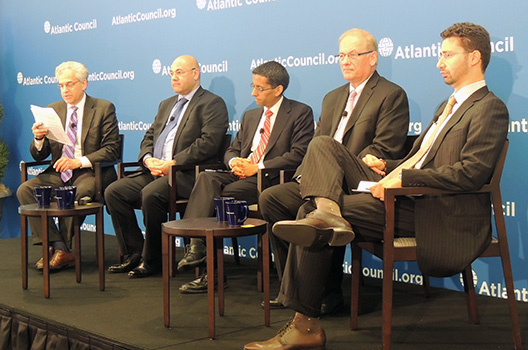 The alarming expansion of the jihadist group the Islamic State of Iraq and al-Sham (ISIS) has prompted regional and international powerbrokers with vested security and economic interests in the broader Middle East to reassess their regional strategies. The United States and key Gulf states on one side, and Iran and Syria on the other, share an interest in the defeat of ISIS and the overall stability of Iraq. But is this common interest strong enough for long-standing rivals to put their differences aside in the name of regional security?
The alarming expansion of the jihadist group the Islamic State of Iraq and al-Sham (ISIS) has prompted regional and international powerbrokers with vested security and economic interests in the broader Middle East to reassess their regional strategies. The United States and key Gulf states on one side, and Iran and Syria on the other, share an interest in the defeat of ISIS and the overall stability of Iraq. But is this common interest strong enough for long-standing rivals to put their differences aside in the name of regional security?
To address these critical issues, the Middle East Peace and Security Initiative, part of the Atlantic Council’s Brent Scowcroft Center on International Security, hosted a panel discussion on July 21, 2014 with remarks by H.E. Lukman Faily, Iraqi ambassador to the United States; Frederic Hof, senior fellow at the Rafik Hariri Center for the Middle East at the Atlantic Council; Bilal Y. Saab, senior fellow for Middle East Security at the Brent Scowcroft Center on International Security at the Atlantic Council; Michael Singh, managing director at the Washington Institute for Near East Policy; and moderator Barry Pavel, vice president and director at the Brent Scowcroft Center on International Security at the Atlantic Council.
With the rise of ISIS, failed efforts to develop a more inclusive Iraqi government, and an announcement of a referendum for independence by the Kurdish Regional Government in the North, “Iraq is at a breaking point,” said Pavel. ISIS has been able to deny territorial control of two nation-states, Pavel noted, framing the rise of ISIS as part of a more endemic problem of the rise of nonstate actors in key regions across the world – a trend that is bearing out the era of individual empowerment that was outlined by the NIC’s Global Trends 2030 report.
In his inaugural event at the Atlantic Council, Faily called for a comprehensive strategy and a new doctrine to combat terrorism, emphasizing the gravity of the threat Iraq and the broader region confront: ISIS is “an existential threat, the likes of which we and our neighbors in the region have not seen before,” Faily stated. Faily called for a common effort to address the security, political, and humanitarian crises caused by ISIS activity in the region. He specifically endorsed more meaningful US assistance, including air support and other essential forms of military aid that can turn the tide against ISIS.
Addressing the potential for a coalition based on common interests, the panel seemed pessimistic that the US and key Gulf states could partner with the likes of Iran and Syria to defeat ISIS. Highlighting the dichotomy between Iranian and US interests and positions, Singh argued that while both Iran and the United States oppose ISIS, they have vastly different interests in Iraq that would prevent cooperation. Hof echoed Singh’s pessimism, citing the impracticality of cooperation between the United States and the Assad regime to combat ISIS. While both countries want to see an end to the extremist militant group, Hof argued that partnering with the Assad regime would accomplish little as they have a tacit alliance with ISIS against the nationalist opposition forces and instead called for aid to the moderate opposition. Saab noted that, of the Arab Gulf countries, Saudi Arabia has the biggest stake in what happens in Iraq. He discussed Saudi Arabia’s goals in Iraq vis-à-vis Iran, describing the current stalemate in Iraq as a “balance of terror today between the Iranians and Saudis.” Saab highlighted the role of several Sunni tribes as an available alternative to Iran in eradicating the threat of ISIS. Overall, the panel agreed that although ISIS threatens these countries’ key strategic interests, a coalition among these odd bedfellows would ultimately be impractical and would complicate policy issues, particularly for the United States.
The July 21 discussion is part the Atlantic Council’s critical work on ISIS and the threat of nonstate actors to the nation-state.
